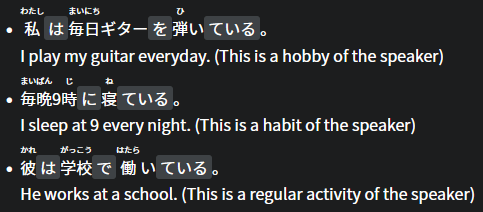Oh, I see what you’re saying now. From that perspective, you’re right. It wouldn’t necessarily be wrong to say 毎週土曜日に私の母にクッキーをくれている. It would sort of be like the difference between the English phrases, “My friend brings cookies to my mother every Saturday,” and, “My friend is bringing cookies to my mother every Saturday.” They mean practically the same thing. The nuance difference is subtle, and in my opnion, unreliable. Sometimes speakers pick the gerundive over the present without much thought to it.
The key difference to note is that ~ている uses the stative verb いる. When you say 連用形+ている you’re saying you “exist in a state of (doing/being) …” This differs from simply saying, “I do/am …” but as you found, the difference is subtle, especially where recurring activities are concerned. The speaker’s choice of word often comes down to how permanent or established the action or state is in their mind. Also, as the Bunpro “caution” note there points out, when ている is used for habitual activities, it’s usually together with a time expression to clarify. That’s because ている has a strong sense of being in that state or doing that action continuously.
If we reduce the uses to simple sentences, we can see the distinction a little clearer.
- 食べる
I eat
- 食べている
I am eating
- 毎朝七時に食べる
I eat at 7 o’clock every morning (I perform the action of eating at 7 o’clock every morning)
- 毎朝七時に食べている
I am eating at 7 o’clock every morning (I am in a state of performing the action of eating at 7 o’clock every morning)
In the case of #1, the sense of time is either absent entirely, or it’s indicative of a recurring, habitual activity. For #2, the sense of time is continuous. The speaker is currently eating and will continue to be for some indefinite period of time. #3 is the same as #1, except the time expression pushes the meaning fully into the habitual sense. Finally, #4 actually has the same continuous meaning as #2, but the time expression now acts as a boundary for the period of time the verb expresses. Instead of the time period being indefinite, it’s now “every morning at 7 o’clock.” The distinction for #3 and #4 is blurry for sure, I think that’s why the Bunpro team added the cautionary note to the ている grammar point.
When you answered that question, did you try entering くれている? If so, was it marked wrong or did you get a hint steering you back toward くれる? I ask because it’s clear from the expected answer they’re wanting to quiz you on the habitual meaning of the plain form of the verb in that sentence, but as you discovered, it’s not necessarily wrong to use the continuous form there if the speaker thinks the activity will continue for the foreseeable future.





